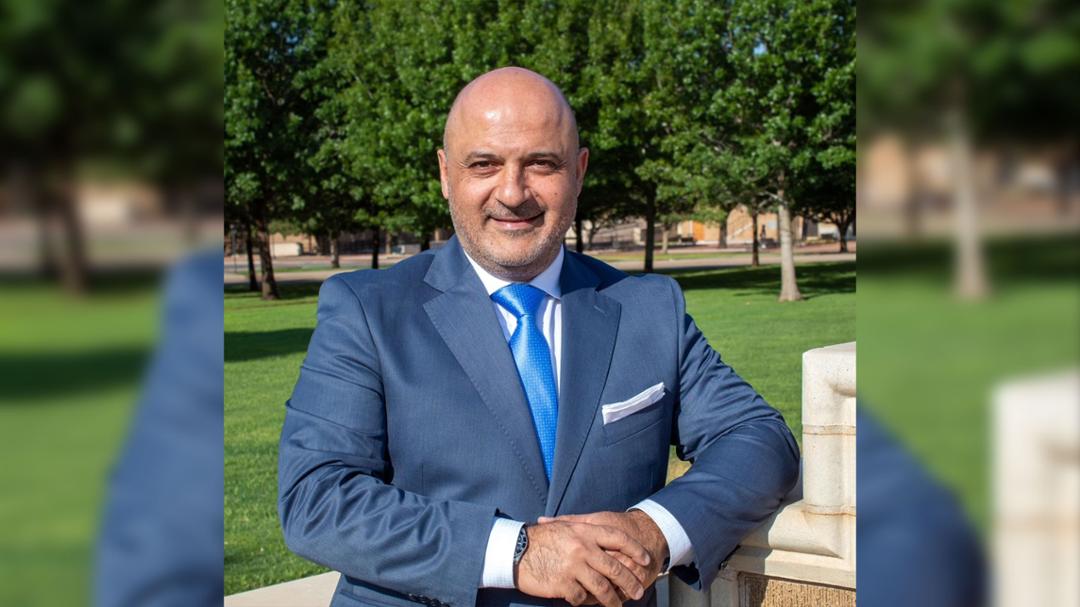Since taking over as chair, Rashid Al-Hmoud has emphasized teamwork and shared governance as the department has enjoyed a renaissance.
Rashid Al-Hmoud confesses the story has a certain “Field of Dreams” feel to it, and he has leaned into a paraphrased version of that classic film’s well-known and recurring mantra: If you build it, they will come.
Turns out, that’s what’s happening, not in terms of a baseball field emerging from an Iowa cornfield, but in the Department of Economics at Texas Tech University emerging from the academic shadows with a higher, more recognizable national profile.
In both cases, this work is neither quick nor easy. Al-Hmoud has been relentlessly disciplined in the two-plus years since he took over, but he was hardly a newcomer to the department. His is truly a rising-through-the-ranks story, arriving at Texas Tech in the early 1990s as a doctoral student before becoming a faculty member in 1995.
“I have been here so long that I know what the potential is and what we can do,” he says from his corner office on the second floor of Holden Hall. “I am one of those who wanted to be a department chair and said so to our previous chair, Klaus Becker, who was a mentor and good friend and had done a lot to the department.”
When Becker unexpectedly passed away in May 2022, Al-Hmoud was well prepared to follow in his footsteps and serve as acting chair before being named interim chair a short time later. His official promotion to department chair occurred shortly after the arrival of Tosha Dupras, who had been named dean of the College of Arts & Sciences.
“Rashid has done an amazing job,” she said. “In our first meeting, he came in with a lot of data and told me to post it up on my bulletin board, which I did. He asked me for a chance to change things in terms of bringing a higher profile to the department, and I said, ‘OK, I am going to give you a chance to do this.’”
From that moment on, Al-Hmoud zeroed in on a handful of critical, interrelated objectives. None was more important than his desire to bring a more formal operating structure to the department through a shared governance approach with faculty. That was the crucial necessary step toward making everything else happen.
His approach was to operate more as a general partner at a law firm rather than a company CEO. He wanted to send a signal of the need for collaboration instead of direction coming from the top down.
“Everything we were going to do had to be voted on by faculty, every single thing,” he said. “I was serious about that then, and I am still serious about it today. This is a faculty-governed institution, and that is very important.”
Instead of meeting once per semester, the department would now meet at least once a month. He appointed an associate chair and formed an executive committee that would serve in an advisory capacity to Al-Hmoud. Department bylaws have been formulated and discussed thoroughly.
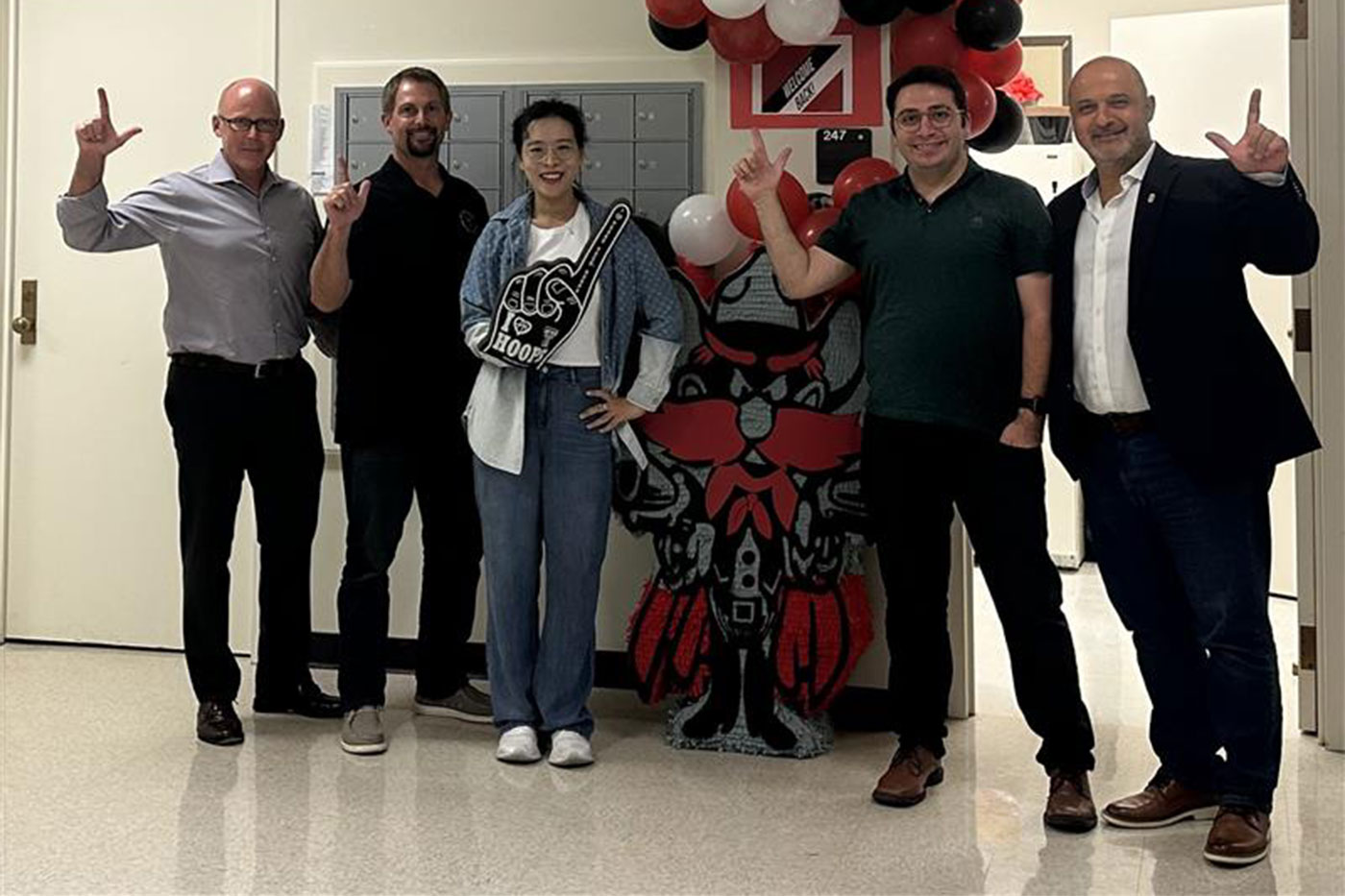
It was a dramatic departure from what had been the status quo. The two previous economics chairs had led the department a combined 28 years. Al-Hmoud has no designs on having such a long tenure.
“I don’t intend to be in this position for 13 or 15 years,” he said. “When I feel like my job is done, I will go do something else. That includes coming back to a faculty role, teaching and conducting research. What’s important to me is the next person who comes in as department chair will have a solid foundation to build on.”
The mission became making a good department even better through a series of strategic tweaks and minor course corrections. He emphasized increasing faculty numbers and adjusting curriculum, with both measures meant to heighten the department’s visibility for prospective students and faculty.
Dupras had a front-row seat for the unfolding transformation. Once faculty were not just on board but helping steer the ship, it became a matter of staying focused and executing the vision over the long term.
“Every meeting after that first one was strategic,” she recalled. “He talked about what the department had to do to increase its competitiveness, and he was able to do that because of his leadership style.”
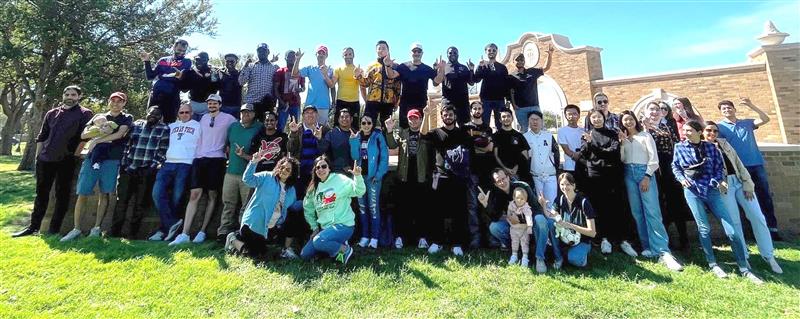
As collaboration became the norm, faculty ideas sprang forth from a seemingly bottomless well of innovation. They just needed a little encouragement, and Al-Hmoud turned out to be the right leader in the right place at the right time.
“Faculty members have vision too,” he said. “Once the door opened, the amazing ideas started pouring in, and that led to these very significant and ambitious changes in just a year and a half. A lot of the changes that were made were not mine. They are theirs. My only role here is to clear the path – like in (Olympic sport) curling, and be a facilitator and an enabler.”
One noticeable change involves interdisciplinary collaboration with the creation of a new bachelor of science joint degree in economics and mathematics. Freddie Papazyan, an assistant professor in the department who just completed his first year at Texas Tech, championed the idea.
Papazyan had specific knowledge of the degree, having majored in math and economics as an undergrad at the University of Southern California.
“It is an excellent major that provides students with a lot of value, both intellectually and in terms of career development,” he said. “It provides students not only with a formidable toolbox of hard skills that allows them to do advance quantitative work, but also with soft, qualitative skills that allows them to effectively communicate their work.”
For Al-Hmoud, working with mathematics to offer a degree that sculpts both soft and hard skills from day one was the sort of low-hanging fruit the department needed to generate early momentum.
After Papazyan made his initial pitch, he sent Al-Hmoud a list of other institutions offering the degree.
“It was a who’s who in economics and primarily on the east and west coasts,” Al-Hmoud remembered.
He made a quick call to Magdalena Toda, chair of the Mathematics and Statistics Department and asked about the feasibility of offering the joint degree. The interest was immediate, and Texas Tech is in the final stages of development of the degree, which Al-Hmoud said would be the first such degree at a public institution in Texas and the surrounding states.
“It will happen because the economics and mathematics faculty want it to happen,” Al-Hmoud said. “In economics, math is the language used. If you want to understand economics, you must have a solid math foundation to support you.”
Another big change in the works is taking place at the graduate level, where the department is adjusting curriculum to ensure it is STEM-designated. Economics officials were receiving a number of regular inquiries about whether courses included a science, technology, engineering and math emphasis.
The department dug into the query and found other institutions had converted their graduate programs, and in some cases, undergraduate programs, to a STEM thrust. Texas Tech is beginning to do so with its doctoral programs with the plan to include other degree paths as soon as possible.
It is both a simple and complicated process as changes require a new CIP (Classification of Instruction Program) code comparable with a STEM degree. As new economics courses become available, they will receive a STEM-compatible CIP code as well.
“The only thing that changes is the number, but it takes a while because each application requires numerous approvals,” he said. “We did not have to do a whole lot because our graduate courses are highly quantitative and based on math and econometrics.”
Ultimate approval rests with the Texas Higher Education Coordinating Board. If approved, Al-Hmoud believes Texas Tech will be better positioned to lure more top-notch graduate students.
“We have added more courses to our program to strengthen it,” he said. “We put our program on steroids, creating a third micro theory course and a third macro theory course, as well as two additional econometric courses. Once a student goes through this program, they will feel very comfortable with their ability to understand theory and to understand application of theory as supported by econometrics.
“This enables our graduate students to produce peer-reviewed research while still in graduate school.”
Economics faculty also have identified data analysis as another area where it can increase its appeal. Likewise, the department is examining ways to incorporate teaching about artificial intelligence (AI) into its curriculum. For Al-Hmoud, this is where the rubber meets the road.
“We are reacting quickly to the rapidly changing labor market requirements as well as the expectations of students,” he said. “Recognizing that big data is the new oil, do our students know what to do with data and how to handle it?”
The economics department offers a minor in Economic Data Analysis last year and is working to expand courses in this area with all of them offered online. Eventually, Al-Hmoud wants to see his department play a big part in the human-centered AI studies, which is an initiative currently being developed at Texas Tech. The emphasis would focus primarily on the consumption of AI, rather than its production.
Complementing that effort, the Department of Economics plans to expand the data analysis minor to a major with students able to earn a Bachelor of Science in Economic Data Analysis with a graduate degree plan also on the drawing board.
“What I hope we can do is create a Master of Science in Economic Data Analysis and fast track it, so when a student comes in, after five years, they earn a bachelor’s and master’s,” he said. “That is the future. I tell students all the time they must develop skills in how to handle data, analyze it and interpret it. We are listening to the market and adjusting.”
Economics is also brainstorming possibilities in health economics with an idea percolating that could involve collaboration with the Honors College.
All of this energizes Al-Hmoud because he sees these new and bold ideas being embraced by the university’s leadership.
“From the dean to the provost to the president and all the way to the Board of Regents, they have opened their arms and said, ‘anything you need,’” he said “Maybe I am just fortunate to be here now.”
Dupras said Al-Hmoud’s ability to build relational capital with faculty is one thing, but he has also delivered the goods, which gives him credibility both inside and outside the department.
“He has really empowered the faculty to make these changes,” she said, “and they have happened internally. It has been a grassroots effort. He has embraced every avenue of opportunity.”
The place where this may be most visible is the number of faculty members, which Al-Hmoud has focused on growing steadily. For many years, the number was static at 13, but enough growth has taken place recently that economics now has the enviable problem of needing more space in its Holden Hall offices.
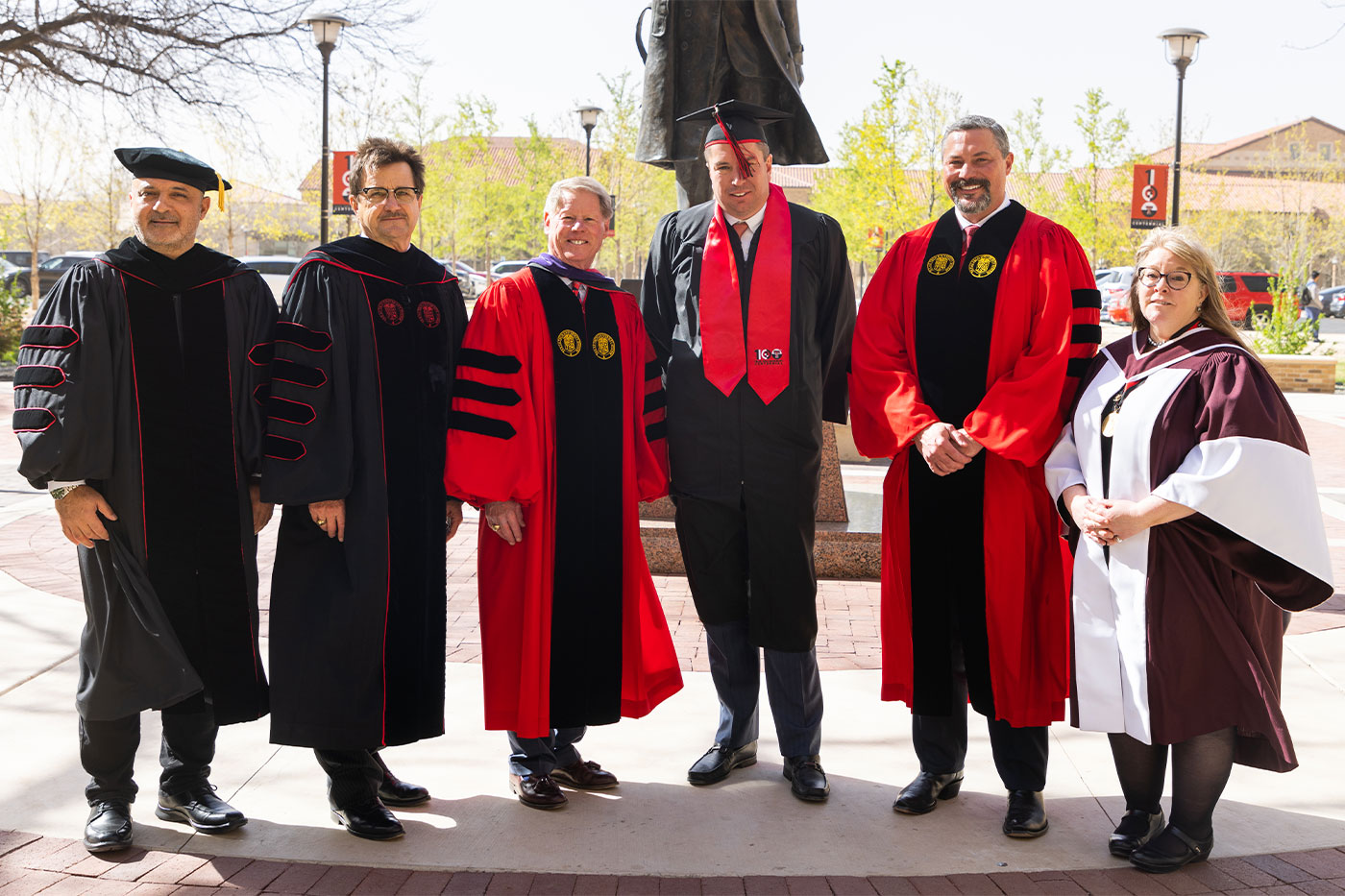
He began by adding James Kemper as lecturer, something the department had not had previously, and then, thanks to joint funding from Texas Tech Online, he brought on a professor of practice, Alejandro Abarca.
In the fall of 2025, the department plans to welcome an additional tenure-track faculty who is a post-doc at Ohio State. She is working with a research group on a project funded by the National Science Foundation (NSF) that she will bring to Texas Tech.
During his first two years as chair, Al-Hmoud will take the faculty number from 13 to 17, a significant increase in a short span of time.
Yet plenty of work still remains.
“We are still not at an equilibrium yet,” he said. “We are about 90% done for our grad program in terms of creating and converting to make everything STEM-compatible. Now the focus is on the undergrad program.”
He sees another 12 to 18 months of similar intentional effort to move the undergrad program across the finish line.
“We have made some changes to our recruiting process that ultimately made us more aggressive,” said Kaj Gittings, associate professor of economics. “The result has been some truly talented and exceptional hires recently. We also have a dean who is very supportive of our department. Dean Dupras has been encouraging and helpful from the beginning.”
The department is enjoying an upward trajectory, but Al-Hmoud knows the momentum lasts only as long as the focus. He believes the economics department has a lot to offer Texas Tech and its students.
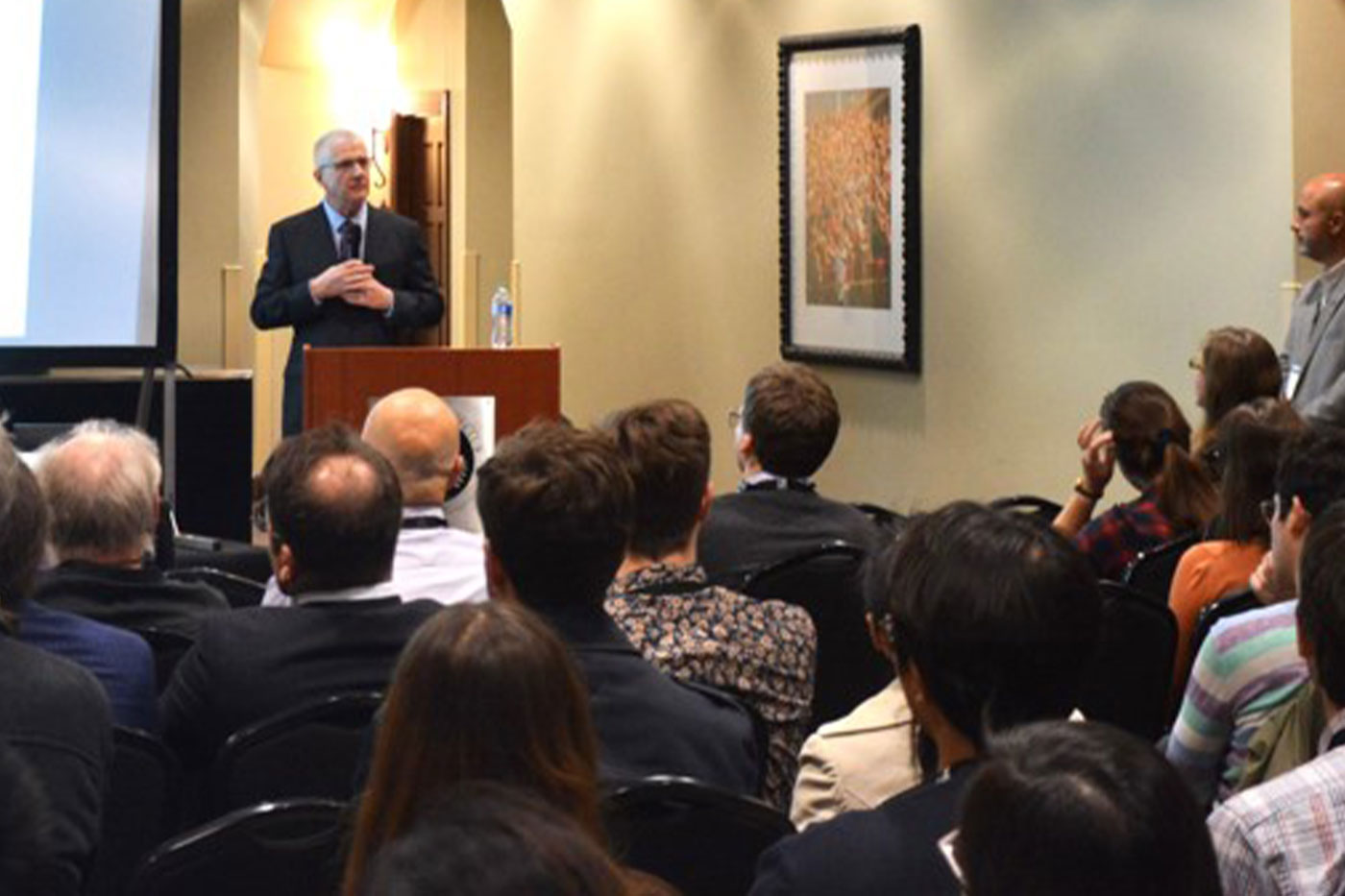
Recent philanthropy has also helped increase the department’s appeal. In 2021, economics alumnus John Sellers established the $1 million Dr. Rashid B. Al-Hmoud Scholarship in Economics, which provides $45,000 of annual support for undergraduate and graduate students in the department.
The gift has had a dramatic impact on economics with 33 graduate and undergraduate students receiving support through the scholarship during the current academic year.
“I think our image was a little introverted at one time,” he allows. “I am really hoping this image has started to change, and I am hearing it is. I am doing everything in my power to change that.
“I am surrounded by some of the smartest people, and my faculty and colleagues are some of the most talented people you can have. They are doing incredible things in terms of impactful research and great teaching. They are inspiring in the classroom.”
That, in turn, inspires Al-Hmoud to proudly bear the economics banner far and wide.
“We are starting to see the slope change,” Dupras said. “The things they are trying to do, they take time. Rashid has been very intentional about building the brand of the department, and I think what is happening there is causing people to sit up and take notice.”
The department’s growing cachet was evident last fall when it hosted the Midwest Macroeconomics Conference, which Al-Hmoud describes as “the holy grail for macroeconomists.” It was the first time for the department to host a conference.
The conference brought over 140 researchers from all over the world to West Texas and included two keynote presentations from Federal Reserve Bank economists. It was just the kind of public-relations jolt the department needed.
The other piece Al-Hmoud spends time addressing is making sure the department’s personnel are top of mind for economics-related presentations or when subject-matter experts are needed to provide context around complex topics.
“If you need someone with economic expertise, come to us,” he said. “Our value is in our ability to take the complicated stuff that maybe only a handful of people understand and explain it to the layman, the policymaker, the average Joe, so they understand.
“I want the economics department at Texas Tech University to be a go-to place for expertise. If attorneys, bankers, people in business, energy producers, or our city leaders want an expert opinion on any matter related to economics, I want them to come to us first. We have the resrouces and we are capable.”
That is Al-Hmoud’s view from the top, but it’s not the only vantagepoint in the department.
“All of the exciting and positive developments in our department are due in no small part to our chair,” Papazyan said. “He is truly an outstanding leader who is hard-working and passionate for our department. Having him at the helm is a significant part of why I am excited to be here and excited for what’s to come.”

